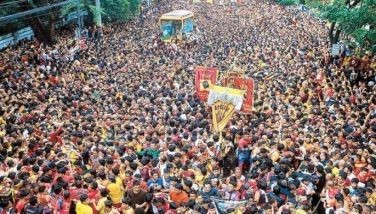UN allots P26.6-M for Maguindanao
COTABATO CITY, Philippines - Representatives of the United Nations (UN) on Monday forged with the Autonomous Region in Muslim Mindanao (ARMM) an agreement on joint implementation of a multi-million food security and climate change mitigation project in Maguindanao province.
Praveen Agrawal, senior representative to the Philippines of the UN’s World Food Program (WFP), Cesar Galvan of the UN’s Food and Agriculture Organization (FAO), and ARMM Gov. Mujiv Hataman signed in Cotabato City, in the presence of regional officials, a memorandum of understanding (MOU) on the project.
The WFP and FAO have been helping rebuild for years now some of the impoverished, conflict-stricken areas in the autonomous region through interventions meant to improve the productivity of peasant communities.
Under the MOU, the WFP and FAO shall earmark P21.9 million, and P4.7 million, respectively, for the new project, which will benefit thousands of farmers in Maguindanao.
Maguindanao, a component province of ARMM, is a known bastion of the Moro Islamic Liberation Front (MILF), which has an on-going peace deal with the government. The government and MILF are also aiming to foster normalcy in guerilla enclaves through socio-economic interventions based on the March 27, 2014 Comprehensive Agreement on the Bangsamoro.
Agrawal said food and nutrition security is very important in rebuilding communities in Maguindanao into peaceful, progressive agricultural areas.
He said local folks need agricultural empowerment for them to become capable of producing food, with sufficient fiscal and physical support from agencies that are capable of extending help.
“And it’s a continued privilege working with ARMM in terms of promoting food security,” Agrawal said.
Hataman and his regional agriculture secretary, Makmod Mending Jr., separately told reporters they are thankful to the two UN agencies for responding positively to calls for humanitarian assistance to Maguindanao’s internally displaced people, whose lives were made miserable by conflicts in years past and perennially recurring floods.
Many towns in the province that are located along the 220,000-hectare Liguasan Delta easily get flooded whenever water levels in nearby marshlands rise during the rainy days.
The Liguasan Delta, the world’s largest, is a catch basin of dozens of rivers that spring from surrounding forested hinterlands in the neighboring Sultan Kudarat, North Cotabato, Bukidnon and South Cotabato provinces.
Under the MOU, the WFP, the FAO, and the ARMM government shall jointly focus on capacity-building initiatives intended to improve the productivity of farmers through “food for work,” or “cash for work” packages, for them to have something for their families while they wait for the harvests of crops propagated with the help of the three “cooperating entities.”
The FAO shall provide farmer-beneficiaries with fertilizers, vegetable seeds and necessary trainings to maximize their capability to produce enough food, while they wait for their rice and corn harvests.
“Majority of the flood victims have difficulty recovering from devastation so we need to give out seeds, fertilizers. We shall help them raise vegetables,” Galvan told reporters.
Mending said the ARMM’s Department of Agriculture and Fisheries (DAF) shall provide beneficiaries of the project with goats that they can breed both for meat and milk production, and for marketing purposes to augment their income.
Mending said DAF-ARMM will also disperse open-pollinated variety corn seeds to beneficiary-farmers.
“We shall also conduct, with the help of our technicians, practical farming classes for farmers,” Mending said.
- Latest
- Trending

































